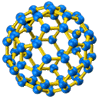What are Fullerenes?
Fullerenes are a class of molecules composed entirely of carbon, in the form of hollow spheres, ellipsoids, or tubes. The most well-known and studied fullerene is Carbon 60 (C60), also known as a buckyball. Fullerenes were first discovered in 1985 by a team of scientists led by Sir Harry Kroto, Robert Curl, and Richard Smalley, for which they were awarded the Nobel Prize in Chemistry in 1996.
Here are some key features of fullerenes:
- Carbon 60 (C60): This is the most famous and studied fullerene. It consists of 60 carbon atoms arranged in a soccer ball-like structure with 12 pentagonal and 20 hexagonal faces. The molecule has exceptional stability and unique properties.
- Hollow Structure: Fullerenes have a hollow structure, which gives them interesting properties and potential applications in various fields, including materials science, nanotechnology, and medicine.
- Electrical Conductivity: Fullerenes, including C60, exhibit good electrical conductivity. This property makes them valuable for certain electronic applications.
- Spherical and Tubular Forms: In addition to spherical fullerenes like C60, there are also cylindrical fullerenes known as carbon nanotubes. These tubes can have varying diameters and lengths and possess unique electronic and mechanical properties.
- Applications: Fullerenes have been studied for their potential applications in various fields. They show promise in areas such as drug delivery, medical imaging, materials science, and even as antioxidants due to their ability to scavenge free radicals.
It’s worth noting that fullerenes are a diverse family of carbon allotropes, and researchers continue to explore their properties and potential applications. The discovery of fullerenes has expanded our understanding of carbon chemistry and opened up new avenues for research and technological innovation.
The discovery of fullerenes in 1985 led to a new field of study and a New Material Class of pure carbon that is significantly different from other forms of carbon, diamond and graphite. Carbon Fullerenes are spherical, caged molecules with carbon atoms located at the corner of the polyhedral structure consisting of pentagons and hexagons, much like the shape of a Soccer ball. Carbon Fullerenes come in many forms, the most abundant form is Carbon 60 (which has a soccer ball shape), Carbon 70 (which has more of a rugby ball shape) and Carbon 84 (spherical). Fullerene get the name from the geodesic dome shape which was research and promoted by Buckminister Fuller. Following the discovery of Fullerenes another new carbon structure known as Carbon Nanotubes was discovered. Nanotubes are seamless cylinders of hexagonal carbon networks (tubes) that are formed either as a Singlewall molecule or Multiwalled molecules.
These materials and other modified Fullerenes derivatives are available from SES Research and are commonly shipped worldwide. You can now buy fullerenes and buy nanotubes here at SES Research.

Carbon 60
ESS60 – Carbon 60 99.99% UHP (Ultra High Purity) VOD (Vacuum Oven Dried) Solvent Free*
| Item | Catalog | Price ($U.S.) | Buy |
|---|---|---|---|
| ESS60 – Carbon 60 99.99%, 1/2 gram, Processed for Safer Human Consumption | 600-ESS90-500MG | $169.95 | Add to cart |
| ESS60 – Carbon 60 99.99%, 1 gram, Processed for Safer Human Consumption | 600-ESS90-1G | $329.95 | Add to cart |
| ESS60 – Carbon 60 99.99%, 5 grams, Processed for Safer Human Consumption | 600-ESS90-5G | $1,550.00 | Add to cart |
Carbon 60 99.95% UP (Ultra Pure) VOD (Vacuum Oven Dried)Solvent Free*
| Item | Catalog | Price ($U.S.) | Buy |
|---|---|---|---|
| ESS60 – Carbon 60, 99.95+ %, 1 g, Processed for Safer Human Consumption | 600-ESS50-1G | $249.00 | Add to cart |
| ESS60 – Carbon 60, 99.95+ %, 5 g, Processed for Safer Human Consumption | 600-ESS50-5G | $1,125.00 | Add to cart |
Carbon 60 99.8% Unprocessed
| Item | Catalog | Price ($U.S.) | Buy |
|---|---|---|---|
| Carbon 60, 99.8%, 1 gram – N2 Purged | 600-998-1G | $189.00 | Add to cart |
| Carbon 60, 99.8%, 5 gram – N2 Purged | 600-998-5G | $925.00 | Add to cart |
Carbon 60 99.75%(contains <3% solvents by weight, not recommend for lipids oil consumption)
| Item | Catalog | Price ($U.S.) | Buy |
|---|---|---|---|
| Carbon 60, 99.75+ %, Reagent, 1 g | 600-9975-1G | $169.00 | Add to cart |
| Carbon 60, 99.75+ %, Reagent, 5 g | 600-9975-5G | $825.00 | Add to cart |
Carbon 70 98.0%
| Item | Catalog | Price ($U.S.) | Buy |
|---|---|---|---|
| Carbon 70, 98.0+ %, 1 gram | 700-9854-1G | $325.00 | Add to cart |
| Carbon 70, 98.0+ %, 5 grams | 700-9854-5G | $1,200.00 | Add to cart |
| Carbon 70, 98.0+ %, 10 grams | 700-9854-10G | $2,325.00 | Add to cart |
| Carbon 70, 98.0+ %, 50 grams | 700-9854-50G | $10,580.00 | Add to cart |
| Carbon 70, 98.0+ %, 100 grams | 700-9854-100G | Call for Price | |
| Carbon 70, 98.0+ %, 250 grams | 700-9854-250G | Call for Price |
Carbon 70 99.0%
| Item | Catalog | Price ($U.S.) | Buy |
|---|---|---|---|
| Carbon 70, 99.0%, 1 gram | 700-9999-1G | $395.00 | Add to cart |
| Carbon 70, 99.0%, 5 gram | 700-9999-5G | $1,600.00 | Add to cart |
| Carbon 70, 99.0+ %, 10 grams | 700-9999-10G | $3,100.00 | Add to cart |
| Carbon 70, 99.0+ %, 50 grams | 700-9999-50G | $14,699.00 | Add to cart |
| Carbon 70, 99.0+ %, 100 grams | 700-9999-100G | Call for Price | |
| Carbon 70, 99.0+ %, 250 grams | 700-9999-250G | Call for Price |
Fullerene Extract
| Item | Catalog | Price ($U.S.) | Buy |
|---|---|---|---|
| C60/C70, Approx. 70% C60, 28% C70, 2% higher, 10 grams | 300-6070-10G | Call for Price | |
| C60/C70, Approx. 70% C60, 28% C70, 2% higher, 50 grams | 300-6070-50G | Call for Price | |
| C60/C70, Approx. 70% C60, 28% C70, 2% higher, 100 grams | 300-6070-100G | Call for Price |
Purity is expressed of fullerene content compared to other carbon fullerenes content.
Tested by HPLC (High Performance Liquid Cartography)
Example: Carbon 70 98%- contains 98% C70 and 2% other carbon fullerenes
* Result is less than the Reporting Limit but greater than or equal to the Method Detection Limit and the concentration is an approximate value. – GC/MS VOA (8260B).

